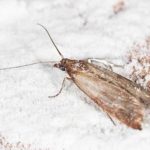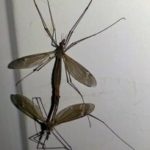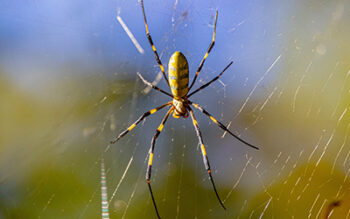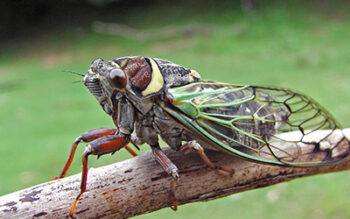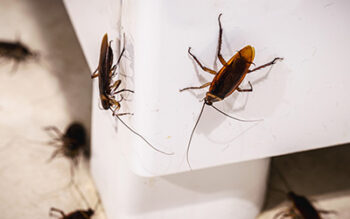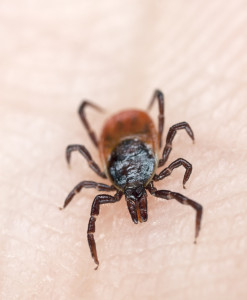
Ticks in Tennessee during the summer can be very frustrating. Actually, as I wrote this blog there were several words describing ticks that floated to the surface: creepy, gross, worrisome, concerning… just to name a few. Mostly, people are very fearful. Not really about the tick, itself, but more about the diseases caused by the bite of a tick.
The best cure for tickborne diseases such as Lyme Disease and Rocky Mountain Spotted Fever is to avoid getting bitten by ticks.
This is another one of those situations where pest-related problems concern our health. Since we are in the business of pest control and are not health professionals, we generally prefer not to comment on the medical conditions caused by the pest. We do recommend information on the CDC site titled Symptoms of Tickborne Illness. If you have health symptoms that you suspect may be caused by a tick or other pest then we suggest that you contact your physician. What we can do is educate you on tick control in order to reduce the chance that you may be bitten by a tick.
Ticks are arachnids, not insects, and classified as an external parasite.
A lot of people are surprised to learn that ticks are actually in the same family (arachnid) as spiders, mites, and scorpions. They have 8 jointed legs and no antennae. They require a blood meal from a host in order to survive. A tick will attach firmly while they slowly feed on the blood of their host. They will feed, unnoticed, for several days before they release their grasp. They will feed on mammals, birds, reptiles and amphibians.
There have been many species of ticks found in Tennessee. The three most common species are the American dog tick, lone star tick, and brown dog tick. All of these common ticks have four life stages- egg, larva, nymph, and adult. Each of the stages, other than the egg, requires a separate animal host to complete its development, which all together may be two or three years long. Each blood-engorged female leaves her host animal and lays a single mass of 3,000 to 6,000 eggs.
Ticks in Tennessee are most active from April through September. Though, it is not uncommon to see some tick activity through the winter months. During periods of high activity we recommend that you remain extra vigilant. Avoid areas known to be infested with ticks such as wooded and bushy areas with high grass and leaf litter. If you have to walk though these types of areas we recommend that you apply a repellent according label directions. Also, walk in the center of trails to avoid brushing up against vegetation.
Wear long sleeve shirts and pants. Tuck your pants into your socks to prevent ticks from climbing up the inside of the pant legs. Also, wear light-colored clothing so that you can detect ticks more easily. Upon returning from tick infested areas make sure to thoroughly check your body for ticks. You will want to quickly remove all ticks that are found.
Modify your environment to make it less desirable to ticks
Maybe you’re not going on a hike in the woods but you want to reduce or prevent a tick infestation around your home. There are several non-chemical things that you can do:
Make your surroundings less inviting to rodents and wildlife. They are often carriers of ticks. Reduce the rodents and you will reduce the ticks. It’s a win-win situation.
- Repair areas where rodents can enter the home.
- Remove wood piles and debris that make a good nesting area for rodents.
- Keep pet food stored in sealed containers
- Keep the lawn mowed and weeds to a minimum
 Don’t forget about your four-legged babies, too. Please discuss tick treatment for your pets with a veterinarian. There are many treatment methods available and something that works well for one pet may not be best for the other. Cats and some breeds of dogs can be sensitive to some products. So, it is always best to check with your vet, first. Also, you will want to inspect your pets and their bedding frequently for ticks.
Don’t forget about your four-legged babies, too. Please discuss tick treatment for your pets with a veterinarian. There are many treatment methods available and something that works well for one pet may not be best for the other. Cats and some breeds of dogs can be sensitive to some products. So, it is always best to check with your vet, first. Also, you will want to inspect your pets and their bedding frequently for ticks.
The final measure for tick management is to hire a professional such as The Bug Man in Murfreesboro to treat the exterior of your home. Our technicians are very knowledgeable about areas that make a great tick habitat and areas that don’t. Most people are surprised to learn that ticks will avoid direct sunlight. So, treating the entire lawn is rarely necessary. We have noticed that customers on our mosquito program usually do not have a problem with ticks. This is probably due to the fact that mosquitoes and ticks have similar habitats such as the trees, shrubs, and shaded areas.
Need a Pest Control Estimate?
We'll call you! Leave your information below.

